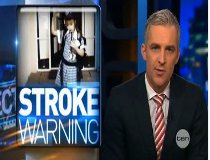 This week is National Stroke Week and while it’s commonly known that strokes affect adults, many are not aware that they also affect children.
This week is National Stroke Week and while it’s commonly known that strokes affect adults, many are not aware that they also affect children.
Caitlin Melville was home playing with her dog when she began to experience a severe headache. She ran screaming to her mum Julie, clutching her head in pain. Just six-years-old at the time, Caitlin fell unconscious and was rushed to The Royal Children’s Hospital (RCH), where doctors found she had suffered a stroke.
When Caitlin woke up she couldn’t speak and was paralysed down the left side of her body. “She had to start from scratch,” said mum Julie.
After six-months of extensive rehabilitation at the RCH Caitlin was finally able to go home.
“Stroke is not something that parents really think of if their child develops problems such as weakness of the arm or the face, or problems speaking. And that’s one of the factors that contributes to the delays to diagnosis of stroke,” said RCH neurologist and head of the RCH stroke service, Dr Mark Mackay.
Parents are urged to remember the acronym FAST when checking for stroke symptoms:
Face – has their mouth dropped?
Arms – can they lift both arms?
Speech – is their speech slurred?
Time – time is critical.
It is estimated there are 350 cases of childhood stroke each year in Australia.
Click below to watch the full story on The Project.



